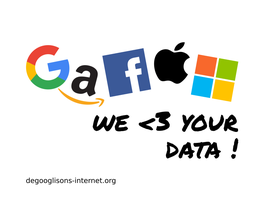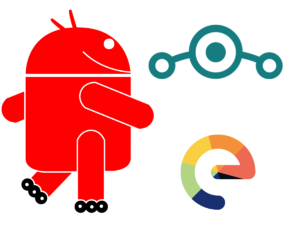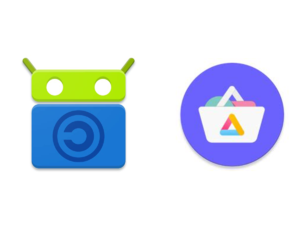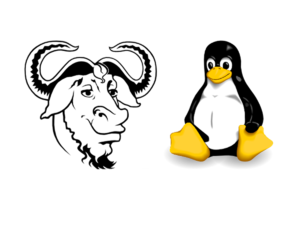Archive:How to stay away from Google and other evil tech giants: Difference between revisions
mNo edit summary |
mNo edit summary |
||
| Line 346: | Line 346: | ||
* 2022-09-10: Finally added video conference section. | * 2022-09-10: Finally added video conference section. | ||
{{Category |category=Unrelated stuff}} | |||
Revision as of 08:25, 23 September 2022

This post doesn't have much to do with the Fediverse, but if you like the Fediverse because it is social media without an evil tech giant behind it, then you might like the other tools and services mentioned here.
This is my (PaulaToThePeople's) personal list of tools to avoid Surveillance Capitalism. Wherever possible I will recommend privacy-friendly, free (as in freedom) software, but if no such software is available the main goal is just to get you away from the worst offenders, a.k.a. #GAFAM (Google, Amazon, Facebook, Apple & Microsoft) or #FAANG (incl. Netflix) or #GMafia (incl. IBM). Personally I'm also including eBay, Twitter, Yahoo & Cloudflare on the list of evils.
I will try to keep this list up to date, add more stuff and fix mistakes that are pointed out to me (see #Changelog). Please also give me tips for other tools I could use, but don't be mad if I don't have the time to look into and add all of them.
For other similar lists check out these websites:
- Degooglisons (Framasoft)
- Ethical Tech Giving Guide (FSF)
- Liberate Your Android (FSFE)
- No More Google
- restoreprivacy
- Tutanota
Operating Systems
Mobile Operating Systems

- Android based OSes
- Replicant (Freedom and Privacy Tip) is the only Android OS that is 100% free software, so all proprietary Android parts are removed. It is clearly the most privacy friendly Android flavor, but since it is only supported on a limited number of mostly old devices and it lacks many features people are used to on their smartphones it's mostly relevant for activists and free software idealists. They have some great recommendations on how to be extra safe.
- Lineage OS (Beginner Tip) is a great compromise between privacy and usability for most users. It is actively developed by a great community and receives timely security updates and Android upgrades and comes with some cool built in features that other Android OSes lack.
- Let me here mention other AOSP-based OSes in general. Most are probably similar to LOS when it comes to privacy, but have less features.
- Lineage OS for microG is great if you are a little more dependent on apps that refuse to work without Google. MicroG is a free implementation of Google Services, so your device and apps can use Google's services while sending a minimal amount of data to Google - but still some.
- /e/ is a great option if you still miss more services Google usually offers. With an /e/ account you can sync your data from your /e/ device to your /e/ cloud.
- Not an OS, but as the next step on the spectrum between living completely without Google and living with as much Google as you need I should mention OpenGAPPS. It is a free script that installs ❗️ the Google Apps and Services on your Android phone, so if you choose to do that you are already very dependent on Google, but you can choose different packages which include more or less apps - so at least you don't have to have all Google apps on your phone if you don't need them.
- Other notable Android-based OSes are CalyxOS and GrapheneOS.
- I haven't extensively tested any Non-Android OS, so I can't say much here. PureOS would probably be my first choice as the most privacy friendly option. I tested Ubuntu Touch for a while in 2017 and was quite pleased with it. It's definitely worth checking out if you don't like Android.
Mobile App Stores

- F-Droid is the only App store you really need on your mobile phone. It works on all Android flavors and comes only with free software. ❗️F-Droid contains apps that promote bigotry, racism, trans-phobia and worse. Some of these apps only exist for that purpose, but the F-Droid community can't seem to make up their mind and remove them.
- Repositories: In F-Droid you can choose different sources for apps. Besides the main repo I'd recommend enabling the Guardian Project repo in the settings and if you want more apps to choose from get Izzy’s repo. Beware with other repos, if you're not absolutely sure you can trust their maintainers.
- Alternative client apps: If you don't like the look and feel of the F-Droid client app I'd recommend you try G-Droid. It has a lot of exciting new features and an active developer who is open to input. Another alternative would be M-Droid.
- Aurora can be used additionally if you absolutely think you need some apps that are not available on F-Droid. You can get all gratis apps from the Play store with a fake account. ❗️You'll still be sending some data to Google, but less than if you'd have the Play store and Google services on your phone. Also many apps you can get there are dependent on Google software or contain other adware/spyware.
Desktop Operating Systems

- GNU/Linux is the 3rd big operating system that everybody knows besides Windows and Mac OS and of those 3 it's the only free OS. There is not one GNU/Linux though that you can download and install, but there are very many distributions. This is not the place to get into all of them. Also choosing a distro is a very personal process, so you will have to do your own research. For full freedom you'd have to go with a flavor endorsed by the FSF. Here is a list. I'll mention a few of them below as Freedom Tips. Btw, these distros are ordered by bloodline and timeline, not by how much I recommend them.
- Debian is one of the oldest distros and has a strong ethical codex that all included software has to follow - which of course is not necessarily true for all Debian derivates.
- Ubuntu (Beginner Tip) is based on Debian and generally more often suggested for GNU/Linux beginners, but less so by freedom and privacy advocates. Ubuntu is the first GNU/Linux distro I ever used and I'm still happy with it.
- Linux Mint is based on Ubuntu. I (sometimes) use it on my secondary computer and even though many say it's more beginner friendly than Ubuntu, I can't say I agree. ⚠ The documentation for Mint is jailed in Cloudflare’s walled garden (on readthedocs).
- Lubuntu (Environmental Tip) is an Ubuntu derivate that like Ubuntu itself you don't usually hear mentioned as a very privacy friendly choice, but it is very lightweight, fast and energy-friendly so it is regularly recommended to install on old devices that are getting slow. Saving a computer from going to e-waste this way is great for the environment.
- Trisquel (Freedom Tip) is another Debian derivate recommended by the FSF and also by privacytools.io. Trisquel is the OS most often pre-installed on #Computers the FSF labels "Respects your freedom".
- PureOS (Freedom and Privacy Tip) is yet another Debian derivate endorsed by the FSF. It comes with extra strict inclusion policies for software.
- another notable Debian derivate is MX Linux while Fedora and Qubes are notable derivates of the Redhat distro.
- BSD should also be mentioned here as the second free OS besides GNU/Linux. It also has many distributions, of which Free BSD is often recommended as a very good option for freedom and privacy.
As for Desktop App Stores many free operating systems come with their own stores. I can only speak for Ubuntu, which comes with a store including free as well as proprietary apps. You can't filter them so you'll always have to check whether the app is free or proprietary before installing. Otherwise just manually install apps from developers you trust by following the install instructions on their websites.
Web Browsing
Web Browsers

- Firefox (Beginner Tip) is the gold standard in free web browsing and even when considering proprietary apps probably only Chrome comes near performance-wise. With many built in features and a huge set of available addons you can turn Firefox into a very privacy friendly browser, but still many groups don't recommend it because it doesn't go far enough. E.g.: ❗️This browser comes with Google as the standard search engine. That's why there are many browsers based on Firefox that e.g. don't come with certain proprietary features, don't use Google as a standard search engine, don't promote proprietary addons or don't have the voluntary tracking options that Firefox has. Here are some examples:
- Tor Browser (Privacy Tip) is the first choice when it comes to privacy. It uses the Tor network to enable anonymous browsing and comes with a lot of additional privacy enhancing features built in. As long as you follow the Tips for using Tor you should be very safe. Browsing via Tor can be quite slow and using the default settings - which is recommended - can break some sites. That's why you might want to use a different browser for sites you use daily and trust and use the Tor browser only for sensitive research.
- Klar is a mobile browser and a great choice for unexperienced users who still want a high privacy level, as it comes very privacy friendly out of the box. You don't have to change any settings (except for the search engine) or (can't) download any addons and Klar will already let you browse the web very privately. E.g. It will regularly delete cache and other private data and it won't let you store passwords. Therefore it is not very convenient to use for browsing sites that you regularly use while logged in. ❗️This browser comes with Google as the standard search engine.
- Fennec F-Droid is an attempt to remove all proprietary bits from mobile Firefox, but there still might be some blobs left and it still comes with anti-features on F-Droid. ❗️This browser comes with Google as the standard search engine.
- GNU IceCat (Freedom Tip) is the FSF’s version built on Firefox ESR, which means it doesn't have the latest fancy Firefox features. Instead it is stripped from most proprietary stuff, comes with FSF endorsed addons preinstalled (and doesn't promote other addons).
- Notable mention: LibreWolf.
- Lightning is a nice browser I used for a while. On many mobile devices it will be one of the fastest browsers and with it you are even able to browse via Tor quite fast. ❗️This browser comes with Google as the standard search engine.
Browser Addons
- uBlock Origin is the only ad blocker you need, but it's more than that. You can block all kinds of stuff. E.g. you can get blocklists from Stephen Black to block fake news, porn, social media or gambling sites. You can also block individual elements that you don't like on sites to give them a more clear appearance.
- Cloud Firewall is an awesome addon that can completely block connections to Google, Amazon, Facebook, Microsoft, Apple and Cloudflare including sites or elements hosted on their clouds.
- https Everywhere Is another must-have that lets you browse the web via secure https if possible and block sites that don't have https set up or at least warn before you access them.
- Multi Account Containers is a great addon by Mozilla that let's you put the sites you browse into containers so the sites don't know what other sites you are on. You can enhance containers features with Switch Containers Plus and Temporary Containers. The latter basically offers the same function as Firefox's private window, only in a tab instead of a new window. You can set up the addon so all links you click that would change the domain you're on are opened in a new temporary container tab.
- uMatrix can be a bit confusing for new users at first, but for me after two days it turned into one of my favorite addons.
- If you use uMatrix then the following otherwise recommended addons are basically redundant: Privacy Badger, Decentraleyes, Cookie Auto Delete, GNU Libre JS, No Script.
- Notable mentions: Location Guard, Terms of Service; Didn't Read, Privacy Settings.
❗️Using browser extensions not many others use leads to your browser leaving a unique fingerprint on a site and that might mean you can be identified or sites at least know which other sites you used. That's why e.g. the Tor Browser doesn't recommend using more than the pre-installed addons.
Search Engines

- Ecosia (Environmental Tip) is not known for being a very privacy friendly search engine (though they are working on it), but for it's "greenness". Ecosia has advertisement, but donates a large portion if it's advertising revenue to reforestation projects and other environmental causes. ❗️Ecosia is hosted on Cloudflare and their image search depends on Bing (Microsoft), but the websearch works even if you block connections to Bing. I use Ecosia as my primary search engine, because sometimes you have to prioritize and I think saving the planet is more important than my privacy. Also I am quite confident I am doing enough to make sure I'm not leaking too much data while using Ecosia.
- Mojeek (Privacy Tip) is a search engine with no tracking whatsoever and a very low environmental impact. It was created in the UK and is hosted on ‘UK’s greenest data center’.
- Notable mentions: Searx, Qwant Lite, Startpage...
Communication
Mail Providers
- Riseup is a anarcha-communist mail provider created especially for activists. To create an account you need invite codes by other users. I am using Riseup for many years now for my private emails and am very happy with it.
- Tutanota (Overall Tip) is very privacy friendly and also CO2 neutral.
Mail Apps
- K-9 Mail is a feature rich mobile Mail app with multi-account support. It has everything you are looking for. Use Open Keychain to encrypt your mails with K-9 Mail.
- Thunderbird by Mozilla could be described the same as K-9, only it's for desktop. Use Enigmail for encryption with Thunderbird.
- Tutanota, the before mentioned email provider comes with it's own mail app on F-Droid. Encryption and other privacy enhancing features are built in. The app gets great reviews from the community.
- Notable mobile mail apps: Fair Email and its fork Simple Email
Instant Messaging

Instant Messaging is a very difficult topic. There is not a single messenger that can be recommended by all privacy advocates. Whenever someone tells me I should switch to messenger XY someone else shows me a list of privacy flaws of messenger XY. See this image to see how complicated this topic is.
- Silence (Overall Tip) is a mobile app for SMS/MMS texting. In their own words - which I wholeheartedly agree with - it is easy, reliable, private, safe and open source. From silence to silence encryption works flawlessly - which is why I think everyone should use it. Otherwise at least the local storage of received and sent messages is encrypted.
- Signal is the perfect chat app to move to from Whatsapp. It works very similarly and is secure and private by default. I recommend downloading it from their site, not from Google Play, even though they recommend the opposite. ❗️ Signal is great, but like I said there is no perfect messenger app and Signal has downsides too. Messages are end-to-end encrypted, but the server is closed source and hosted on evil clouds. So the metadata (phone number, who writes to whom and when) is openly accessible by Amazon, Google, Microsoft & Cloudflare. Read an extensive list of everything that might be wrong with Signal here.
- Not a messenger, but a protocol messengers can converse with is Matrix. It's federated, so like the Fediverse, and fully free software. You can choose a very privacy friendly server to create your account on and then download a messenger like Element and start messaging.
- Another federated and free software protocol is XMPP. There are very many XMPP clients, e.g. Snikket and Conversations.
Video Conference
- Big Blue Button is a great video conference tool that is completely free of trackers. I like to use the German instance Senfcall.
- Jitsi Meet is another option but ❗️ currently it's in the Cloudflare cloud!
Social Media
If you want free and privacy-friendly social media, you are looking for the Fediverse.
The Fediverse is what this wiki is all about. So if you are just reading this article, but haven't checked out the rest of the wiki yet, go to the Main Page for more info.
Localization
- OpenStreetMap (OSM) is a free collaborative maps project with all functions you expect.
- On mobile you'll probably find using OsmAnd more convenient than the website. You can also download maps for offline use.
- OSM depends on contributions. If something is missing on the map just add it. One of the easiest ways to contribute is the mobile app StreetComplete which will simply ask you questions about things near you.
- Transportr is the only additional mobile Navigation app you'll need, namely for public transportation.
- MicroG Unified NLP is your friend if your mobile OS doesn't come with any network location service and GPS is not enough for you. It helps your device get your approximate location via near mobile and wifi networks. To use it you'll also need at least one backend. I recommend the Mozilla backend.
Video
Video Players
- Kodi is a great universal media player for desktop and mobile. Play music, movies, TV shows, podcasts etc from your own Kodi database or stream them. ❗️ But beware of proprietary addons. Unfortunately Kodi doesn't display licenses of addons. Also note that the website is in Cloudflare’s walled garden
- VLC is another great universal media player for desktop and mobile, only not with such a fancy design.
Video Streaming
- PeerTube is a video streaming service that is part of the Fediverse.
- Invidious is a great service for streaming videos from Youtube while keeping Google tracking to a minimum - with the proxy feature (find the tiny ⚙️ Preferences button in the top right corner and don't forget to save) you can watch videos without any connection to Google at all.
- Newpipe is one of many mobile apps that also lets you watch Youtube videos without sending too much data to Google.
Movie/TV Streaming
- Internet Archive: Moving Image Archive has a collection of public domain movies and other videos.
Audio
Audio Players
- The before mentioned Kodi and VLC are great for audio too.
- Banshee is the desktop music player I use, because it has all the functions I need and most other players lack. Unfortunately it is no longer maintained and it does have a few little issues every now and then. Since I don't need any function that would let Banshee access the internet I think the security risk is minimal.
- For mobile, use Simple Music Player or literally any music player on F-Droid that you like and isn't marked with anti-features.
- Notable mentions: Lollypop
- If your favorite music player doesn't come with a plugin for music tagging, or you don't like it use MusicBrainz Picard.
Music Stores/Streaming
- Funkwhale is a great music streaming service that is part of the Fediverse. Anyone can upload music if it is under a license that allows sharing or the uploader owns the copyright.
- Bandcamp is a great site for buying music and it also has lots of free downloads.
Photo
Gallery Apps
- Shotwell is a simple, yet versatile desktop photo library.
- Simple Gallery is my recommendation for mobile, but once again any gallery app from F-Droid will do.
Camera Apps
- Open Camera is a mobile camera app I'd even recommend if I didn't care about privacy at all. There is simply nothing missing in this app.
Image Editing
- Krita is a powerful and yet simple raster graphics editor. For vector graphics Inkscape is probably the first choice.
Image Hosting Services
- Wikimedia Commons is a great source for freely licensed images.
- Internet Archive: Images also contains lots of freely licensed, public domain or fair use images.
Books
Environmental Tip: Generally prefer eBooks and audiobooks over physical books - except second hand. Digitization - if done right - reduces used resources, used energy and waste.
- Wikibooks and Wikisource are part of the Wikimedia Foundation and therefore very trustworthy sources for e-books and papers.
- Internet Archive: Free Books and Izzy's eBook library are great sources for freely licensed books too.
- LibriVox is another source for public domain audio books, but ❗️the site contains Google tracking. You can however access the entire catalogue and more from the Internet Archive: Audio Books & Poetry too.
- Wikimedia Commons has a small category for audiobooks.
Productivity
Clouds & Sync
- Nextcloud is what you use if you need a cloud.
- DAVx⁵ is a mobile app that let's you sync your contacts & calendar to your Nextcloud.
- /e/ cloud is the cloud that comes with the /e/ mobile operating system. You can use it to automatically sync all your important data.
Office
- Libre Office is a full office suite for desktop. I use it everyday and never missed a feature.
- Framasoft is an awesome free software community from France that offers a lot of free online tools for collaborative work on documents among many, many other things. If you know French and another language please help them with translations.
- Cryptpad is a notable mention.
Finance
Payment
- Faircoin is a socialist cryptocurrency. Faircoin's growth rate is controlled and steady to avoid speculations. It is not mined and energy consumption during transactions is low to minimize the ecological impact which is very high for other cryptocurrencies.
Online Stores
- Avocado Store (Environmental Tip) is once again an ethical choice I'm throwing in here. It is a shop for eco-fashion and home supplies where each product must fulfill at least one principle (like bio, long-lasting, recycled & recycleable, vegan,...) . ❗️Unfortunately the site is hosted on the Google cloud and contains Google tracking and all pictures are stored on the Amazon cloud.
- Willhaben (Austria Tip) is an online trading and reselling marketplace that is great to get your hand on anything second hand and commission-free. It's only for Austria though.
Development
I'm not a developer. Not even slightly. So I'll keep this short.
Collaboration Platforms
- Savannah (Freedom and Privacy Tip) is the right choice for 100% free software.
- Codeberg is 100% Free Software and is managed by a non-profit association of FOSS and libre people & financed by its members.
- Gitlab (Beginner Tip) is a collaboration platform often recommended, e.g. by PRISM-break and it is the one F-Droid trusts with their data. ❗️Beware though, the flagship instance Gitlab.com is hosted on the Google cloud and is proxied by Cloudflare (thus effectively in an exclusive walled garden) and it fails many criteria in FSF’s repository evaluation, so don't use that. The community edition is free software and can be used to power platforms hosted on other clouds. E.g.:
- FramaGit is hosted by Framasoft.
- See the catalog of instances
- Notable mention: Gitea
Captcha
I passionately hate Google reCaptcha. There is so much tracking going on on the web that I can just block away - many sites will still work. But once a website developer chooses to use reCaptcha for a site where you need to register to use that's game over.
- qvittersimplesecurity seems to work well, e.g. on gnusocial.cc.
- Securimage seems straight forward looking at their demo.
- Other finds: visualCaptcha, Authen-Captcha, Captcha-reCaptcha, KCAPTCHA
Other
- Matomo is an open alternative to Google Analytics. Or here is a thought: Just don't analyze your customers/community at all!
- Font Squirrel is a collection of free fonts you can use to replace Google Fonts.
Hardware
Generally: You'll want to go with hardware that runs the software we discussed before. If you already have a device where you can flash one of the privacy friendly #Operating Systems I'd recommend you do that instead of buying a new device: Consider e-waste and resources! Also consider buying a used device and/or resell your old device.
Smartphones
- Replicant-enabled devices (Freedom and Privacy Tip) are the first choice for privacy. They recommend the GTA04.
- Fairphone (Environmental Tip) is my personal choice and recommendation. Their focus is on conflict-free resources, good working conditions and circular economy, but e.g. the FP2 also came with an unlocked bootloader, so many of the OSes mentioned before run on it. Also there is an active community avoiding Google which is very helpful.
- Notable Mentions: Purism, Shift
Computers
- Freedom Tip: First choice for full freedom should be a device certified as Respects Your Freedom by the FSF. Second choice would be to get a device from h-node.
- Purism (Beginner Tip) is one of the manufacturers with devices available on h-node. Their Librem devices come with their before mentioned and FSF-endorsed PureOS. They are definitely high up on the list for my next device, not that that's anytime soon. I also recommend them for GNU/Linux beginners because compatibility between device and OS is surely not an issue if both come from the same company.
- why! (Environmental Tip) is a Swiss company that makes repairable computers running Ubuntu. For Linux beginners I can really recommend them. My next computer (which will be in many, many years) will probably be something different though.
Other Devices
- First up: Avoid smart devices, especially home assistents like Amazon Echo, Google Home, Apple HomePod and smart watches like the Apple watch. You don't need them. You really don't, but if I can't convince you then get a Mycroft Mark.
- For other devices check out the FSF recommendations and Mozilla's Privacy Not Included Guide.
- Generally just avoid devices with sensors & an internet connection unless you can definitely trust them, which is only the case if they run free software.
- Devices - even smart ones - without any sensors, without an internet connection and that don't require you to download a proprietary app on your phone where you need to log in with your personal data should be fine.
General Considerations
This concludes the main body of my guide on surveillance capitalism (though updates will follow). Since I got lots of feedback on other aspects of privacy and related topics I'm adding this general section.
The following is a categorized list of articles by people, organizations and communities who have more knowledge on these things than me. I added my thoughts every now and then as well as related tools that are mentioned in the articles and/or I can recommend. Links in the bold categories are to Wikipedia articles. Please let me know if important authors are missing.
- Freedom, Security, Privacy & Anonymity
- Definition of Free Cultural Works by FreedomDefined
- What is Free Software by Gnu/Free Software Foundation
- Why Freedom is essential to Security and Privacy by Kyle Rankin, Purism
- Privacy: Who needs it? by Zak Rogoff, Free Software Foundation
- Free Software vs Open Source
- Open Source Misses the Point by Richard Stallman, Free Software Foundation
- What is Free Software and is it the same as Open Source? by the Open Source Initiative
- TL;DR: Use "Free Software" if you care about the ethics of software freedom and not just the practicality. If you are neutral use FLOSS not FOSS as the latter could be misunderstood as open source software that is free as in free beer.
- Passwords, Password Managers and Two/Multi Factor Authorization
- Creating Strong Passwords by the Electronic Frontier Foundation
- How to Make a Super-Secure Password Using Dice by the Electronic Frontier Foundation
- Using Password Managers to Stay Safe Online by the Electronic Frontier Foundation
- How to: Enable Two-factor Authentication by the Electronic Frontier Foundation
- Tool-Tips: KeePass
- Encryption
- What Should I Know About Encryption? by the Electronic Frontier Foundation
- Key Concepts in Encryption by the Electronic Frontier Foundation
- How Strong Encryption Can Help Avoid Online Surveillance by the Electronic Frontier Foundation
- A Deep Dive on End-to-End Encryption: How Do Public Key Encryption Systems Work? by the Electronic Frontier Foundation
- Tor vs VPN
- [History](https://www.torproject.org/about/history/) by the Tor Project
- How to: Use Tor for Linux by the Electronic Frontier Foundation
- Tor Browser by WorldWideWebWizard
- Choosing the VPN That's Right for You by the Electronic Frontier Foundation
- Virtual Private Networks by Cryptopaper
- VPN Comparison by That One Privacy Site
- VPN + Tor: Not Necessarily a Net Gain by Matt Traudt
- Tool-Tips: Guardian Project F-Droid repo, Tor Browser, OrBot
- Self-hosting vs federated hosting vs centralized hosting
- Decentralization, federation, and self-hosting by Georgia Young, Free Software Foundation
- Yunohost and Freedombox: Self-hosting made easy(er) by Arkadi Cloud
- Tool-Tips: YunoHost, FreedomBox
- General/Other
- Kuketz IT-Security German-Language blog with lots of helpful guides for beginners to experts.
Changelog
- 2019-04-08: Start of drafting.
- 2019-04-13: Publication on Write Freely and initial edits based on great and numerous feedback (e.g. about Fedilab, Telegram, Signal, Tor Browser... ).
- 2019-04-14: Added uMatrix, added other suggestions as notable mentions while explicitly not recommending others that are proprietary software.
- 2019-04-15: Added #Video, #Audio and #Photo sections.
- 2019-04-16: Added Mojeek and a few GNU/Linux distributions.
- 2019-04-27: Added a #Books section and more.
- 2019-04-29: Published Part 3.
- 2019-05-01: Revamped the #Desktop Operating Systems section with some new additions. Also started replacing words the FSF says to avoid.
- 2019-05-02: Added highlights for Beginner, Freedom, Privacy, Environmental and Overall tips in some sections.
- 2019-05-03: Added #General Considerations section.
- 2019-05-10: Updated invidio.us with a tip from @kuketzblog.
- 2019-05-16: Added a few more #Browser Addons.
- 2019-05-22: Updated the #Web Browsers section in celebration of the first stable release for the mobile Tor Browser.
- 2019-05-30: Rewrote the #Instant Messaging section and the text about Tutanota.
- 2020-02-09: General overhaul.
- 2021-01-10: Minor edits (esp. concerning cloudflare).
- 2021-01-13: Replaced Telegram with Signal.
- 2022-06-09: Started move to JoinFediverseWiki.
- 2022-06-21: Finished move to JoinFediverseWiki.
- 2022-09-10: Finally added video conference section.